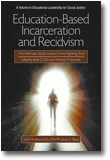 |
Arthur A. Jones, J.D., Dr.jur.
International Human Rights Law and Policy
c/o Los Angeles Community Policing
email to: Arthur@lacp.org
EDITOR'S NOTE: --- Arthur A. Jones and Robin Wiseman are international human rights lawyers with legal educations in the United States and Europe. They are consultants and authors on international policing, social policy and human rights, and regular contributors to the forum here at LA Community Policing.
We're very proud that LACP's own Arthur Jones was lead author of Chapters 8 and 9 in the newly released book Education-Based Incaceration and Recidivism, a work that takes a penetrating look at the needs and challenges of society's disenfranchised jail populations.
For more of his work, please see the LACP's Think Tank. For additional information feel free to contact Dr.
Arthur Jones:
e-mail: Arthur@lacp.org
 |
|
- - - - - - - - - - - - - - - - - - - - - - - - - - - - - - - - - - - - - - - - - - - -
Education-Based Incarceration and Recidivism
The Ultimate Social Justice Crime Fighting Tool
- - - - - - - - - - - - - - - - - - - - - - - - - - - - - - - - - - - - - - - - - - - - -
Order Book HERE |
|
by Arthur A. Jones
email to: Arthur@lacp.org
A volume in the series: Educational Leadership for Social Justice. Series Editors: Jeffrey S. Brooks, Iowa State University ; Denise E. Armstrong, Brock University ; Ira Bogotch, Florida Atlantic University ; Sandra Harris, Lamar University ; Whitney Sherman, Virginia Commonwealth University and George Theoharis, Syracuse University
In Press 2012
Education-Based Incarceration and Recidivism: The Ultimate Social Justice Crime Fighting Tool takes a penetrating look at the needs and challenges of society's disenfranchised jail populations. It is incumbent to encourage public awareness of the causes that underlie the destructive cycles plaguing these populations, including the abuse and neglect that cycle through generations.
When effectively addressed through education the economic burden on society is lightened and an advocacy to increase understanding engenders a humane response.
When connecting education-based incarceration to leadership and social justice, several issues come to mind, beginning with the universal understanding that definitions of social justice are based on a variety of factors, like political orientation, religious background, and political and social philosophy.
An increased body of researchers in educational leadership, ethics, law, sociology, corrections, law enforcement, criminal justice, and public health agree that social justice is concerned with equal justice, not just in the courts, but in all aspects of society. Social justice demands that people promote a just society where people have equal rights and opportunities; everyone, from the poorest person on the margins of society to the wealthiest deserves an even playing field.
The intended audience for this book includes academics, national and international law enforcement agencies, and correctional institutions interested in establishing and assessing the effectiveness of an education-based incarceration program. This book can be used by educators and students interested in studying organizational leadership, correctional theory, recidivism, social and restorative justice, and education-based incarceration. TABLE OF CONTENTS
Series Editor Preface, Jeffrey S. Brooks, Prologue, Brian D. Fitch and Anthony H. Normore. Foreword, Leroy D. Baca. Acknowledgments.
PART I: THE CULTURE AND POLITICS OF CORRECTIONS: A SOCIAL JUSTICE PHEMONENON. A Review of Evidence: The Case for Evidence-Based Incarceration, Brian D. Fitch and Rakel Delevi. History and Politics of Correctional Education, Amy Widestrom, David R. Werner, and Sylvester "Bud" Pues. Assessing Educational Need to Individualize Learning in an Incarcerated Setting, Brian Mattson, M. C. Esposito, and Carolyn Eggleston.
PART II: THE HUMAN SIDE OF EDUCATION-BASED INCARCERATION: UNDERSTANDING RECIDIVISM. Prison Education: The Inmate as Student, David R. Werner, Amy Widestrom, and Sylvester “Bud” Pues. Impact of Correctional Staff Attitudes on Inmate Education, Raquel Warley. Disruptive Innovation: The Role of Technology in Advancing Educational Achievement Among Inmate Populations, Brian D. Fitch, Brian Mattson, and Jeff Mulhaussen. The Reentry Process—Linking Inmates to Community Services: Parallels to the Transition of Youth With Disabilities to a Quality Adult Life, Jessica Nolan Daugherty, Laura S. Abrams, and Gary Greene.
PART III: PROMISING AND PROVEN “BEST PRACTICES”: GLOBAL PERSPECTIVES. Maximizing Benefits of Correctional Educational Programs: Best Practices, M. C. Esposito, Anthony H. Normore, and Arthur A. Jones. International and Comparative Survey of Best Practices in Correctional Education, Arthur A. Jones, Richard Gordon, and Richard Haesly. Teaching Strategies and Practices for Correctional Education, Sara A.M. Silva, Kimberly B. Hughes, Selene Kurland, June Kizu, and Sylvester "Bud" Pues.
PART IV: IMPLICATIONS FOR THE FUTURE OF CORRECTIONAL EDUCATION. Summary, Conclusions, and Recommendations, Anthony H. Normore, Brian D. Fitch, and Sarah Camp. About the Authors.
Respectfully submitted,
| Arthur
A. Jones, J.D., Dr.jur. |
Robin
Wiseman, J.D., Dr.h.c. |
Los Angeles, California |
~~~~~~~~~~~~~~~~~~~~~~~~~~~~~~~~~~~~~~~~~~~~~~~~~
--- Arthur A. Jones and Robin Wiseman are international human
rights lawyers with legal educations in the United States and
Europe.
They are consultants and authors on international policing, social
policy and human rights, and regular contributors to the forum
here
at LA Community Policing.
For more of their work, please see the LACP's Think
Tank.
For
additional information or a complete list of references, contact:
|
 |